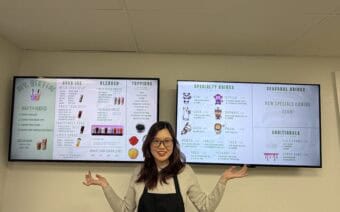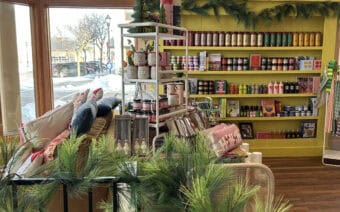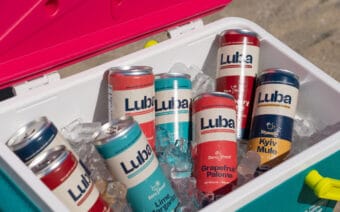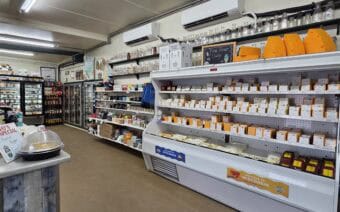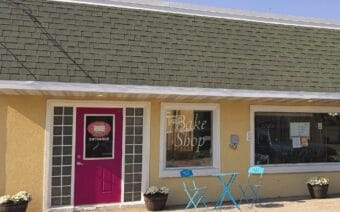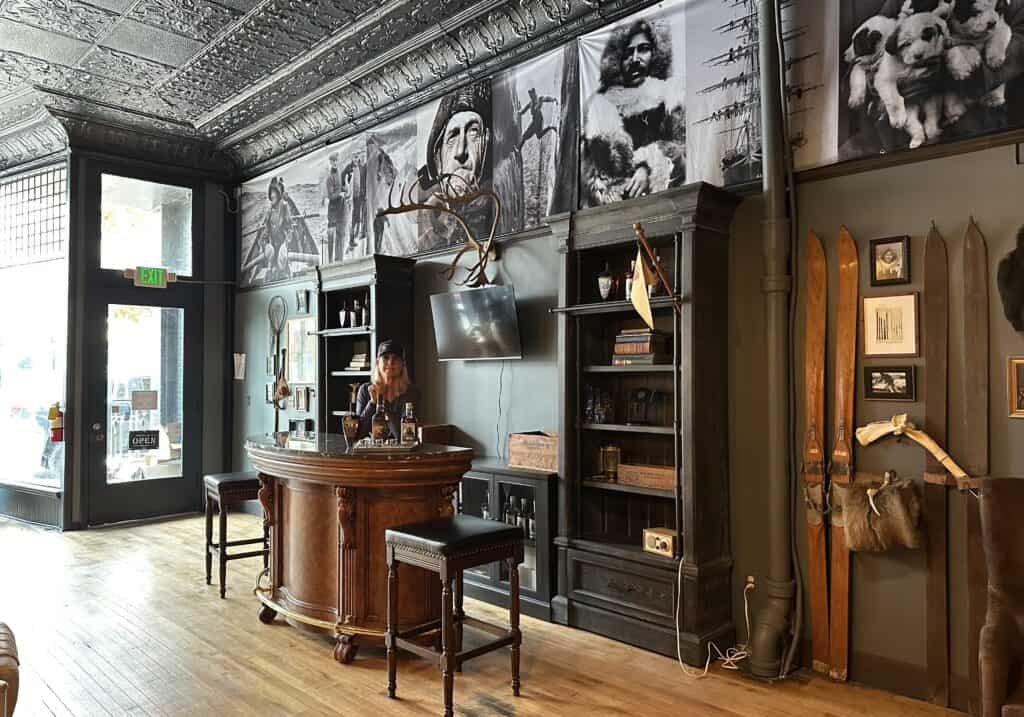
September 8, 2025
ALGOMA – The Maelstrom… Holdfast… Icebound…
Co-owners Martin Pazzani and Kerry Shaw Brown said the intensity to the names of Unbound Spirits products reflects the intense meticulosity of their production.
Yet another product, they said – an Irish whiskey no less carefully crafted, yet more playfully named – called Hooligan Soup serves as a reminder that, serious as its processes may be, the company ultimately aims for enjoyment.
Since releasing the first batch of their premium bourbon – The Maelstrom – in December 2022, Brown and Pazzani said Unbound Spirits’ reputation has continued to spread from maiden visitors to their tasting room (at 318 Steele St. in Algoma) to long-distance “aficionados” and beyond.
With branding evoking maritime adventure and naval grit, the co-owners said the coastal company and each small batch it begets – including this fall’s forthcoming edition of The Maelstrom, subtitled Saga Series 2: Torpedo Juice – aims to offer unique expeditions in “nuanced” taste and “old-school” technique.
“We’re taking some new thinking and marrying it with some old thinking to try and create something that is really a refined, luxury, sipping spirit,” Brown said.
Kindred spirits
Before Unbound Spirits set sail and before the co-owners had even met, Pazzani and Brown said they both worked in marketing.
“My career was based largely on being a director of commercials, TV commercials and things,” Brown said. “Along the way, I got to work with brands like Maker’s Mark, Castle & Key, Gallo wine brands and things like that, and I got to spend a lot of time with the master distillers, the master blenders.”
Pazzani, who currently resides in Connecticut, said his career started with Heublein, later to become Diageo – “the world’s largest spirits company.”
“[Diageo] makes what I call ‘industrial-grade brands,’ because they’re all mega brands made in a big factory, which is the diametric opposite of what we do [at Unbound Spirits],” he said. “We make small-batch, handmade craft brands – which is where all the fun is.”
Pazzani said he first forayed into small-batch spirits about 15 years ago, as a founding partner of a tequila brand.
Unlike mass-produced liquor brands, he said the tequila company taught him to appreciate how small batches “all have different notes, tastes and flavors” and are “not trying for perfect consistency.”
Meanwhile, about eight years ago, particularly as Asian markets developed a new affinity for American bourbons, Brown said the higher-end bourbon he favored became exceedingly rare and costly.
“I decided to dive in myself and start [crafting] some complex blends, extra-aging them using maritime weather conditions, waves, anything – just trying to find ways to capture the old methodology of artisanal spirit-creating,” he said.
For about five years, with his trusty Labrador, Luna, keeping him company, Brown said he crafted practice batches of bourbon in his boathouse.
“I just wanted a really great sipping bourbon that didn’t scorch you – didn’t overpower you with a burn or anything,” he said.
Brown said his research led him to emulate methods taken for granted in the past, though considered “a little crazy” by today’s standards.
“Going down the rabbit hole into the history of bourbons, whiskeys, scotches and all that stuff, the vast majority of them had a large portion of their transportation needs met by vessels that were on the water – whether they be ships or barges or boats – and then some of the transportation was in trucks or trains,” he said.
Brown said studies revealed the constant turbulence and agitation of spirits stored in wooden casks not only gives the spirit greater contact and flavor influence from the charred oak, but it also “shatters the molecules” and “smooths them out” for maximally pleasant sipping.
This concept, he said, led him to attempt to recreate such conditions, storing his casked bourbon on boats.
The name for this creation – The Maelstrom – Brown said, was inspired by the blizzard-like conditions the night of his initial brainstorm.
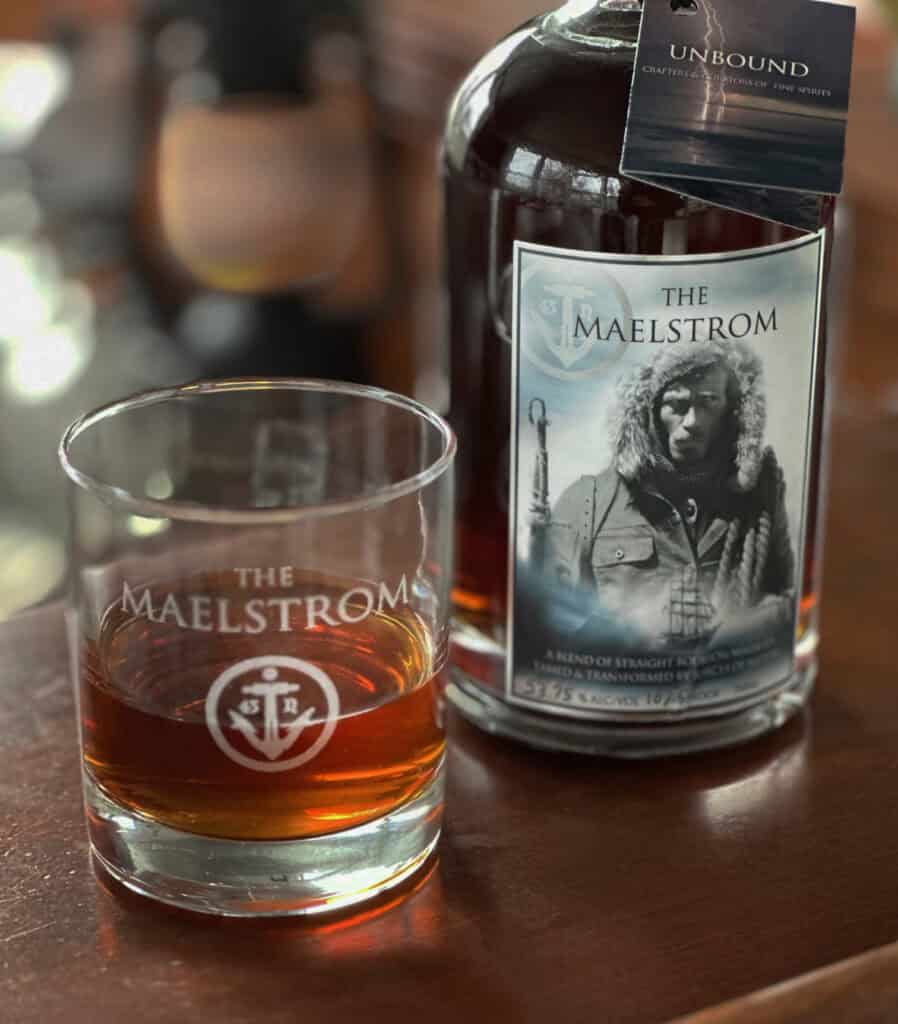
As Brown honed this personal craft, he and Pazzani said their eventual collaboration was spurred by mutual social media connections.
“People knew I was kind of looking for craft [spirit] brands to play around with, and [Brown and I] had about 350 common Facebook friends,” Pazzani said. “One day, Kerry posted something about a bourbon thing he was doing, and a [mutual] friend saw and said [to me], ‘you’ve got to go look at this.’”
Seeing high potential in Brown’s operation, Pazzani said he eagerly reached out.
“[Brown] was playing around with [crafting spirits] in this boathouse in his backyard, and I said, ‘This is a real thing – are you crazy? Companies would kill to have a brand like this,’” he said. “And that’s how it turned out. We just started from stuff [Brown] was playing around with that was, I would say, better than 99% of the brand development work the big companies are doing right now. It’s all fantastic stuff.”
Libation liberation
In light of their enthusiasm for the newly christened Unbound Spirits brand, Pazzani and Brown said they still opted for a modest operation.
“This was an experiment: do it in very small batches, in very small geography with very small expectations,” Pazzani said. “The first batch of The Maelstrom, [our mindset] was, ‘Let’s test the waters and see if there’s something here.’”
Brown said this batch would yield 444 bottles of the bourbon, but thanks to local media coverage – which Pazzani said suggested the company was far larger and more established than it was at the time – the entire batch was sold within a day of its release.
The publicity, Pazzani said, also caught the attention of the annual Green Bay Boat Show, which has since featured Unbound Spirits every year as its sole liquor brand – “because of our maritime DNA.”
Encouraged, and upping production to 1,200 bottles per batch – which was still considered a “very small batch” by industry standards – Brown said agitating the aging casks on boats or even trucks eventually became less feasible, particularly due to transportation challenges in winter.
“So, we teamed up with Clemson University, because one of our partners sits on their engineering college advisory board, and this past year, Clemson engineering students came up with these cask rockers that are these machines that accurately emulate the type of wave action you see on the Great Lakes, where it can be asymmetric,” he said. “You can have rogue waves hitting you. Some are faster, heavier waves. Some are more languid.”
Pazzani said the methods give The Maelstrom, throughout all its subsequent batches, a distinct advantage over a “whiskey that’s just sitting in a rickhouse for six years, still, [where] a guy turns [casks] once a month or once every six months.”
With Unbound Spirits’ production based in Algoma, Brown said the maritime location – prone to swings in weather conditions – also informs the nuanced results of unique batches of bourbon.
Though, he said each batch bears key similarities, “the tasting notes on the back end of the sip are each a little bit different.”
“Batch No. 3 has almost a salted caramel note to it, whereas [Saga Series 2: Torpedo Juice] has more of a dark chocolate, peppery spice to it,” he said.
Brown and Pazzani said Unbound Spirits’ supporters often purchase two bottles at a time from a given release, enabling them to compare notes between batches.
The production efforts and the allowance for such variation, Pazzani said, are the antithesis of larger companies’ approach.
“Industrial-grade spirits and the mega brands would never do this, because it’s ridiculously labor-intensive,” he said. “And, as a result, it’s expensive, and it’s complicated, which is why our products are super premium priced. There’s an incredible amount of age and complexity that goes with it.”
Through the years, Pazzani and Brown said they’ve introduced other products, including:
- Holdfast – considered more of an “everyday” bourbon, affectionately referred to by some customers as “baby Maelstrom.”
- Les Terribles – a triple-casked “super sipper” bourbon finished in French Cognac and Armagnac casks to create “our most complex one of all.” It’s a nod to the nickname the French gave the Wisconsin 32nd Red Arrow Division in World War I, for which Brown said his great-grandfather served as a medic.
- Icebound Vodka – an 86-proof “Ice Age vodka… with legs,” created with glacial water from the ancient Laurentian ice sheet and a “60-hour, slow-drip, charcoal filtration” process.
- Hooligan Soup – Irish whiskey, which, per unbound-spirits.com, is finished in casks used for The Maelstrom, lending “a hint of sweetness… without the rough edges.”
Brown said all Unbound Spirits’ bourbons and whiskeys are aged at least twice in oak barrels, “imparting even more of that charred oak and all those sugars and vanillas” into the spirits.
The bourbons, he said, are slow-proofed and blended from three individually aged bourbons “to truly create something new.”
“I don’t know anyone else in the entire business that does that,” he said of the blending technique.
Also unique to Unbound Spirits, the co-owners said, is their style of branding, which Pazzani said allows for a level of creative boldness large companies would never permit – part of what attracted him to the small-batch category.
“As companies get bigger, they tend to neuter the brands,” he said. “They get all worried about being too toxically masculine or too offensive, so what you get is this vanilla, mediocre nonsense for a lot of brands.”
With Brown’s label design work – featuring photography of American veterans – the co-owners said the Unbound Spirits brand bears a common trait throughout: testosterone.
“We happen to think it attracts people,” Pazzani said. “Some of the common beliefs are that if you’re too masculine [with branding], you’ll scare women off. Absolutely not. It works. The consumer we’re after, male or female, loves the macho-ness of these brands.”
The imagery, Brown said, “harkens back to an era where exploration [and] adventure played a big role in how society evolved.”
He said the branding has also fostered relationships with veteran organizations, to which Unbound Spirits regularly donates bottles of spirits.
Heroic male and female veterans and adventurers are prominently featured in the company’s tasting room, which the co-owners said they opened about a year and a half after The Maelstrom’s initial release.
“Our tasting room isn’t set up like a counter where you come up and you pick three things, try them and then you’re done and you go,” Brown said. “It’s really experiential. It’s almost as if [author Ernest] Hemingway and Quint from ‘Jaws’ had a big den.”
Open from 3-6 p.m. Fridays and from noon to 7 p.m. Saturdays, Brown and Pazzani said the room is a further extension of the Unbound Spirits brand, adorned with historical artifacts and honoring the likes of Admiral Robert Edmund Peary, Ernest Shackleton, Theodore Roosevelt, Roald Amundsen, Matthew Henson, Amelia Erhardt and Aloha Wanderwell.
“We’ll have entire groups come up and spend three hours at the tasting room,” Brown said. “Most places, you don’t spend 20 minutes [there] unless they have a restaurant as well. [The tasting room] is one of the things we wanted to do, and it really has played off what our whole brand is about.”
An ongoing saga
On deck for Unbound Spirits, Brown said, is the next batch of The Maelstrom – Saga Series 2: Torpedo Juice – which is set for a late-September release.
He said the batch’s subtitle references the moonshine U.S. submariners would distill from torpedo fuel – which, according to veteran-led media company We Are The Mighty, was made of pure grain alcohol.
“When [the submariners] were stationed in Japan after the war, they were drinking whiskey that had been at least partially aged in mizunara casks, which are a Japanese oak,” he said. “So, in this batch of Saga series, we’ve recasked them in these small American oak casks, and then we’ve added some of these Japanese oak staves to the batch.”
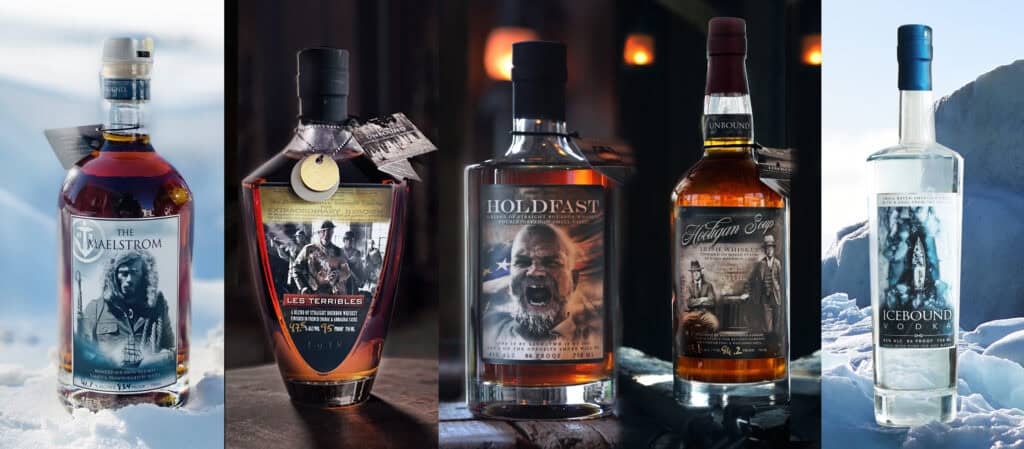
In partnership with the Wisconsin Maritime Museum in Manitowoc, Brown said the bourbon casks will also be transported/agitated aboard the USS Cobia submarine – “the best existing World War 2 submarine there is” – on a round-trip voyage between Manitowoc and Sturgeon Bay.
“Then we’ll be donating back to the museum $30 for every bottle that is purchased,” he said.
Brown said the new batch of Hooligan Soup will also be bottled and released in September.
The duo said supporters’ anticipation for each batch, and the glowing feedback expressed in the tasting room and online – from novices, connoisseurs and fellow distillers alike – continue to drive Unbound Spirits’ sense of adventure.
“Those people who totally get why we do what we do, and who appreciate the complexity of our spirits – it’s the best compliment,” Brown said.
Pazzani said he appreciates the aficionados who have connected with the brand thus far, while encouraging the uninitiated to try Holdfast and Icebound – the two spirits with the least prohibitive price points.
The co-owners said new categories may be on the horizon – citing gin as a popular request – as is the pursuit of broader distribution, but for now, they’re pleased with Unbound Spirits’ current operation.
The full, four-person team, they said, facilitates sales throughout Wisconsin (see the store map on the website for details), as well as Connecticut, and offers online purchases to 40 states. “We’re not super ambitious… We want to create something of value that we can, at some point, maybe sell to a bigger company,” Pazzani said. “We’re in our 60s – we’re not going to be doing this for 20 years – but we’re having fun, so for the moment this is great. We want to create something of value – some brands that will have some real staying power.”
 Did somebody say pickleball?
Did somebody say pickleball? Firm roots in the past, with an eye on the future
Firm roots in the past, with an eye on the future


